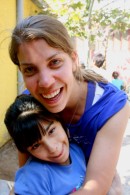By Michelle Newman
VE Volunteer from Pennsylvania, USA
Soledad* was writing out rows of letters for the afternoon homework session. As a 10 year old who cannot read, letters and words do not yet hold meaning for her. Still, Soledad’s love of stories and language is not muted. She loves being read to and often repeats what she hears line-by-line, because her desire to learn trumps the challenge she faces.
Her tenacity was clearer than ever during this particular day’s writing exercise. The tía in charge of homework had asked Soledad to write the letter “g” on the grid paper in front of her. “The letter ‘g,’ like gato (cat),” she repeated. But Soledad was stumped, unable to visualize the letter. She kept saying, “the g? Like gato? I don’t know. I don’t know.”
Though I was working at a different table with another girl, I could hear her frustration. She needed a better trigger and I thought of one of the most popular (and volatile) games we play with the girls: ¡Pesca!, or Go Fish! The Pesca cards each show a letter and a picture with a word that starts with the letter. The goal is to accumulate as many pairs of the letters as possible.
Like most of the girls, Soledad has played Pesca many times and has most of the cards memorized. So, I called over to her: “Soledad, you know what the letter ‘g’ is! Remember the ‘g’ from Pesca?” A small smile grew on her lips and she responded without missing a beat, “Oh, you mean the ‘g’ from guitarra (guitar)?” And with the shape of the “g” finally formed in her mind, she was off and running on her rows of letters again.
Playing Pesca with the girls has taught me many things, but, above all, it has showed me that little things can have an outsized and unexpected effect. Even if it’s subtle, the best way to learn is to play, to make connections while enjoying yourself, to trick yourself into knowing the answer.
*name has been changed


